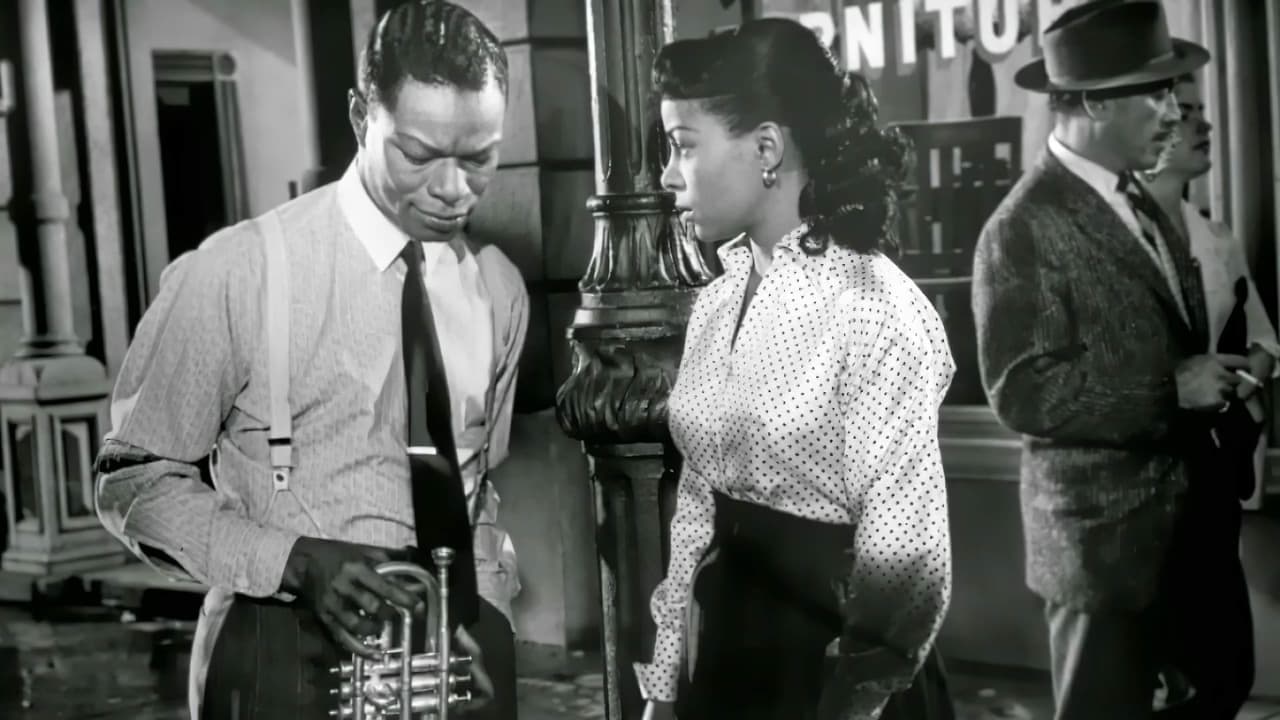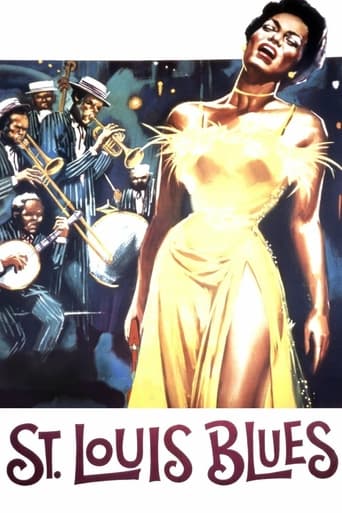

What makes it different from others?
... View MoreSERIOUSLY. This is what the crap Hollywood still puts out?
... View MoreJust perfect...
... View MoreAn old-fashioned movie made with new-fashioned finesse.
... View MoreST. LOUIS BLUES (1958) starts out fine but markedly tires. The direction is all on one level: restrained. Perhaps it was meant to show that blacks were religious, cultured, "civilized," as opposed to the raucous, carousing, loose-living floozies and crapshooters that Hollywood usually portrayed.The movie cries out for color. But someone probably figured that with a cast that's all black anyway, why waste the more expensive film stock!There are other contradictory elements as well. The film wants to be "progressive" and promote jazz. But it also does not want to alienate its religious audience. In that respect, the best thing it does is insert Mahalia Jackson periodically to pick up the spirit. But to have it both ways, when W.C. Handy goes blind and returns to the church, the filmmakers restore his sight (as if God approves of his giving up jazz) before turning him loose again to find fame and acceptance with a symphony orchestra playing the title tune (as if God, in the end, has come down on the side of jazz, as long as it's played as classical music). In real life, of course, W.C. Handy died blind.Nat Cole is admirable, but I suspect that his too low-keyed performance is the fault of the director holding everyone in check. Toward the end of his life, W.C. Handy frequently made guest appearances on TV variety shows. He was polite and mild mannered, almost to the point that you wondered how he could have written such a wide range of songs. In contrast, Eubie Blake at age 100 displayed a far more open and lively personality.Although the movie is 105 minutes long, a studio power must have misguidedly cut out some musical numbers. Why would Paramount hire Cab Calloway and give him featured billing but no song to sing? His character flimflams Handy out of the rights to "Yellow Dog Blues," so he must have done a lively musical performance of it in his club. And why invent the character of Aunt Hagar for Pearl Bailey if no one is going to play and sing "Aunt Hagar's Blues"?Meanwhile, where was the greatest proponent of Handy's music (as well as its best interpreter), Louis Armstrong? He does have a role in THE FIVE PENNIES, the Technicolor biopic of "Red" Nichols (Danny Kaye) that Paramount released the following year.In October 1954 Columbia Records released one of its biggest selling jazz LPs, "Louis Armstrong Plays W. C. Handy."According to George Avakian's jacket essay, in the Times Square editing studio "a handsome old gentleman (of 75 years) sat listening to the tapes of this record, tears streaming from his sightless eyes."'I never thought I'd hear my blues like this,' W. C. Handy said.... 'Nobody could have done it but my boy Louis!'"At some point, it seems, Paramount decided to studiously avoid truly lively interpretations of the songs. At least they could not completely repress the vivaciousness of Pearl Bailey and Eartha Kitt. Besides Technicolor what this movie needs most is a rousing finale with costumed Katherine Dunham dancers.Nowadays Hollywood should forget about remaking great movies. Instead it should concentrate on movies that could have been great.
... View MoreAs long as the great old films are not on home video, we have to search far and long for the elusive cable broadcasts. Well I was pleasantly surprised to see this one air yesterday on Turner Classic Movies. A film that completely reversed the procedure so well known at MGM: keeping actors of color out of the plot of a film so as not to offend the patrons (and sponsors)of Southern movie theaters. Paramount Pictures took such a gamble in 1958 with this biopic of turn-of-the-century blues composer W. C. Handy, son of a rather rigid preacher man, whose musical gifts are repeatedly deflated and discouraged by said father (who believes such progressive music is only the work of shiftless sinners). The big surprise in this film is the warm, sensitive, and totally subdued performances of the majority of the film's lead cast: Nat 'King' Cole as the quiet Handy, Ruby Dee as his patient, waiting-in-the wings fiancée', and Eartha Kitt as a sassy and ambitious nightclub singer. Even Kitt's character- which would normally be presented as a two-dimensional 'bad girl' caricature, shows some interesting depth as she quietly champions Handy's blues and jazz compositions to be seen by a larger, more commercial, audience. The Alan Reisner direction often leans towards the melodramatic, and veterans Cab Calloway and Pearl Bailey aren't given much to do, but the film soars very nicely as a complete movie. Two honorable mentions must be made however, in the names of Mahalia Jackson- whose gorgeous voice can be heard several times in the church scenes as a choir mistress, and Ella Fitzgerald (perhaps my favorite solo singer of all time) who is featured in a *true* cameo appearance singing a single torch song in a nightclub which Handy happens by one evening. It makes one yearn for more early chances like this one, and makes me especially happy that these performers are archived- even in this small capacity- on motion picture film.
... View MoreIt's incredible to see all this talent in one place. It's too bad that afro-americans were not supported commercially in the 50's, this film then could have been easy to find. As it is, the big A doesn't carry (or even mention) it. The performances of eartha kitt and nat cole are pretty subdued, for the period of the piece. But ella fitzgerald swings nicely and pearl bailey has a good moment. As for over all film quality, it's a bit stiff ( e.g., nat cole dropping his cane and falling to his kness against the screen door mimics lou pinela tring to convince an umpire he touched home plate), probably a bit more from direction than lack of talent, and the plot , trite. Fortunately, it doesn't dwell very long on the angst between slices of musical venue. A collector's item and an historical document.
... View MoreA terrific cast, which depicted Southern Black religious traditions and values versus changing times for true opportunity (in the early days). It's a heartfelt movie suitable for the entire family, and should be a suggested viewing in school (if not already).
... View More